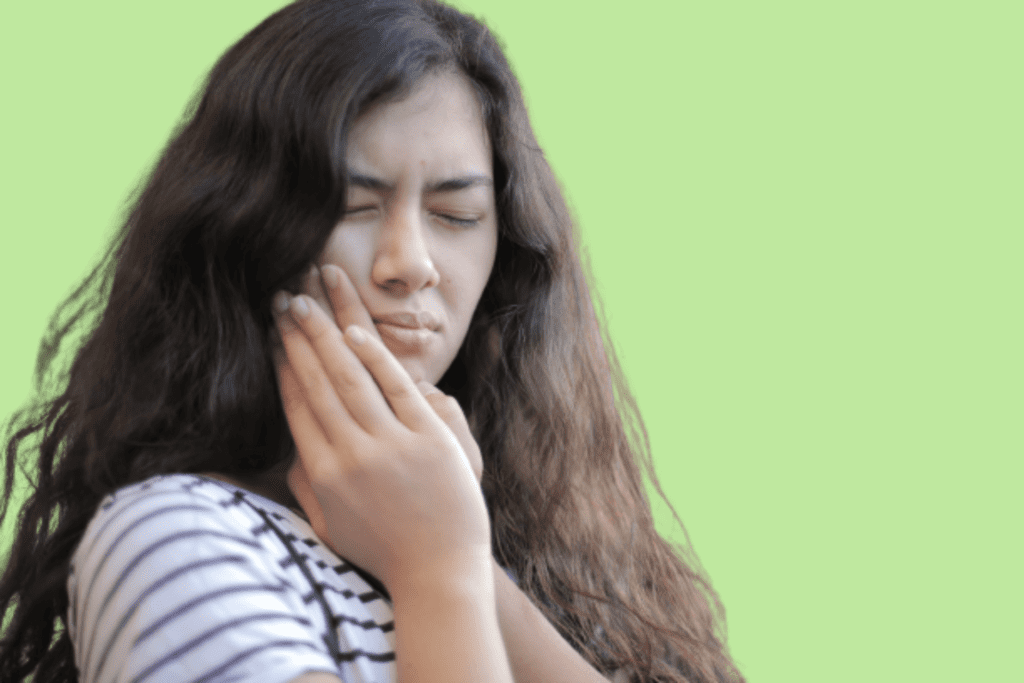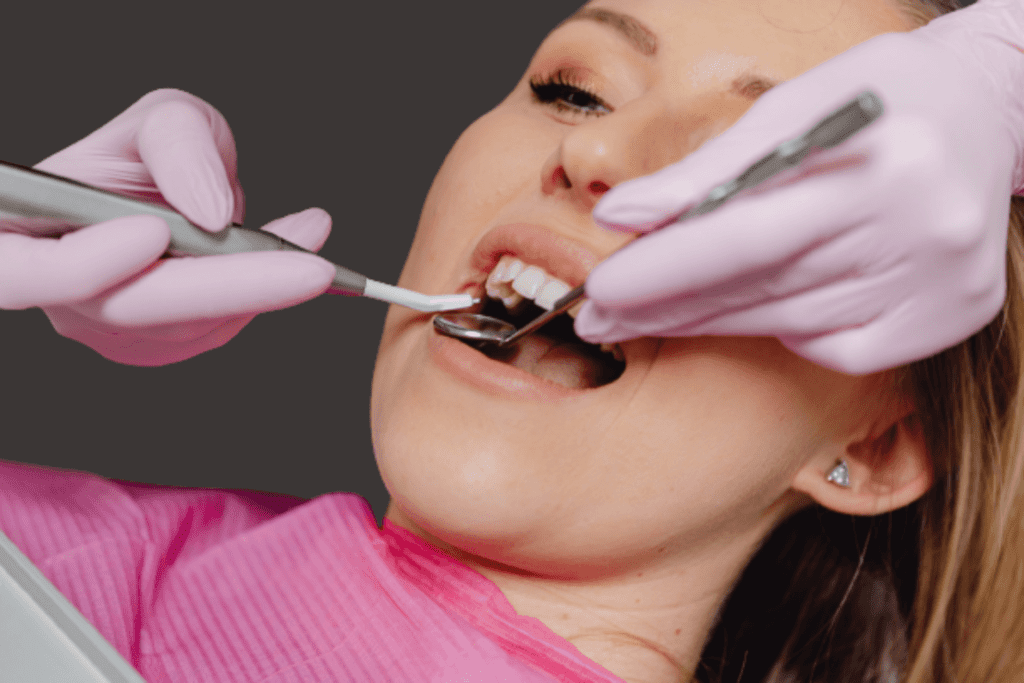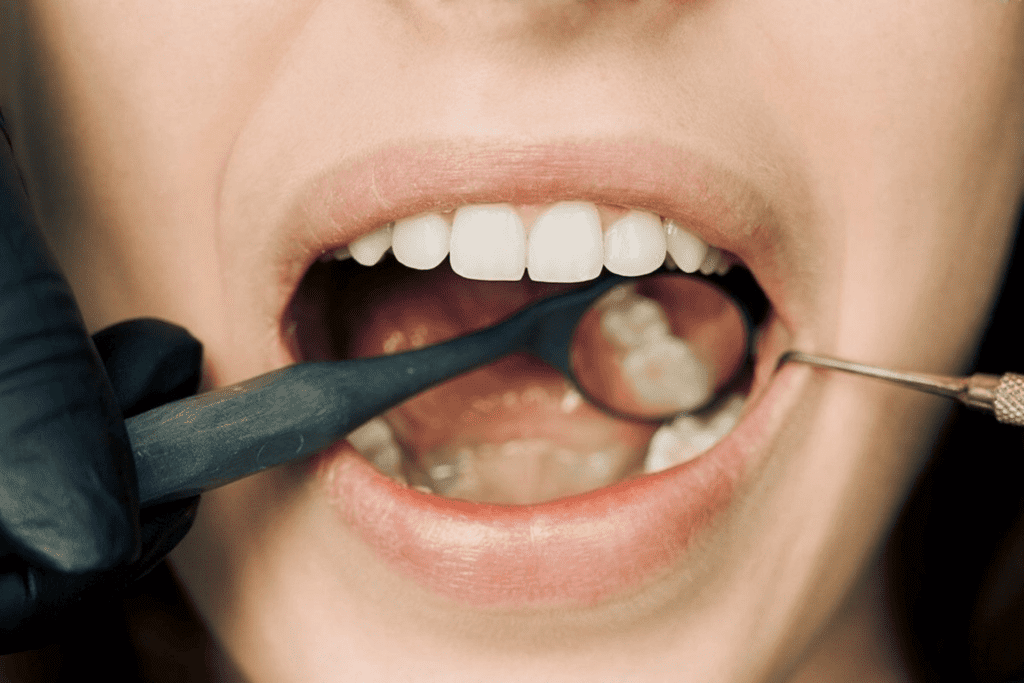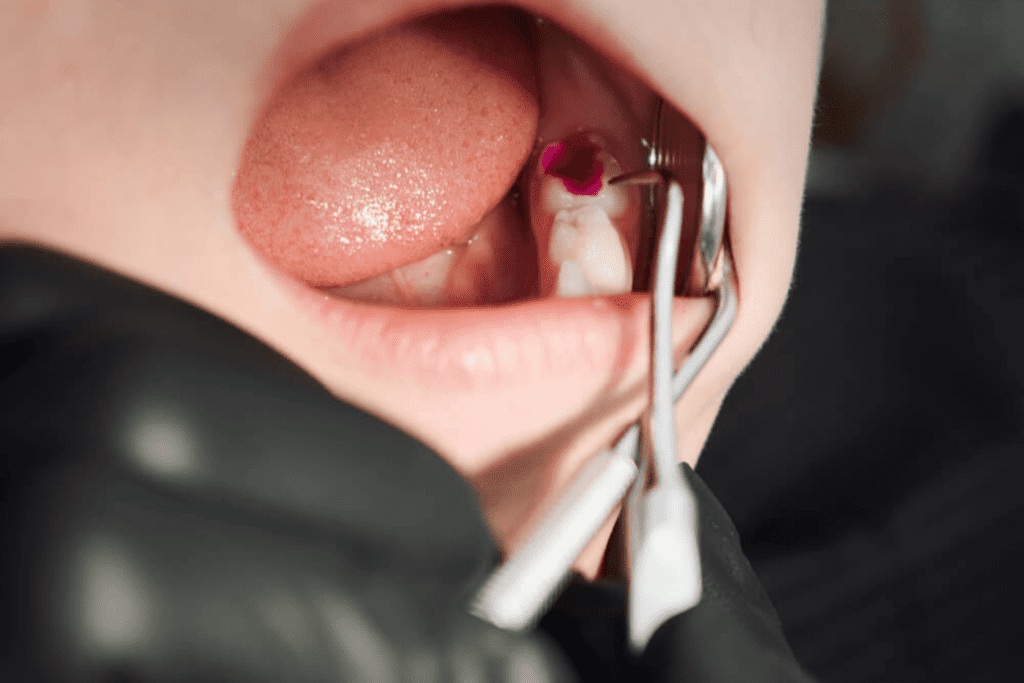We sometimes add products that we believe may be beneficial to our readers. We may receive a small commission if you purchase using the links on this page. Read our affiliate disclaimer
Jaw pain refers to the discomfort or soreness experienced in the jaw area, which can range from mild to severe. It is a prevalent symptom that can impact people of all age groups. Jaw pain can manifest as a dull ache, throbbing sensation, or sharp pain in the jaw, temporomandibular joint (TMJ), or surrounding areas. It may be accompanied by difficulty in opening or closing the mouth, clicking or popping sounds, stiffness, or limited jaw movement. Jaw ache can significantly impact daily activities such as eating, speaking, and yawning, and it is often associated with dental conditions, TMJ disorders, or muscle tension.
Table of Contents
ToggleCommon Causes of Jaw Pain
There are several common causes of jaw pain. Here are a few:
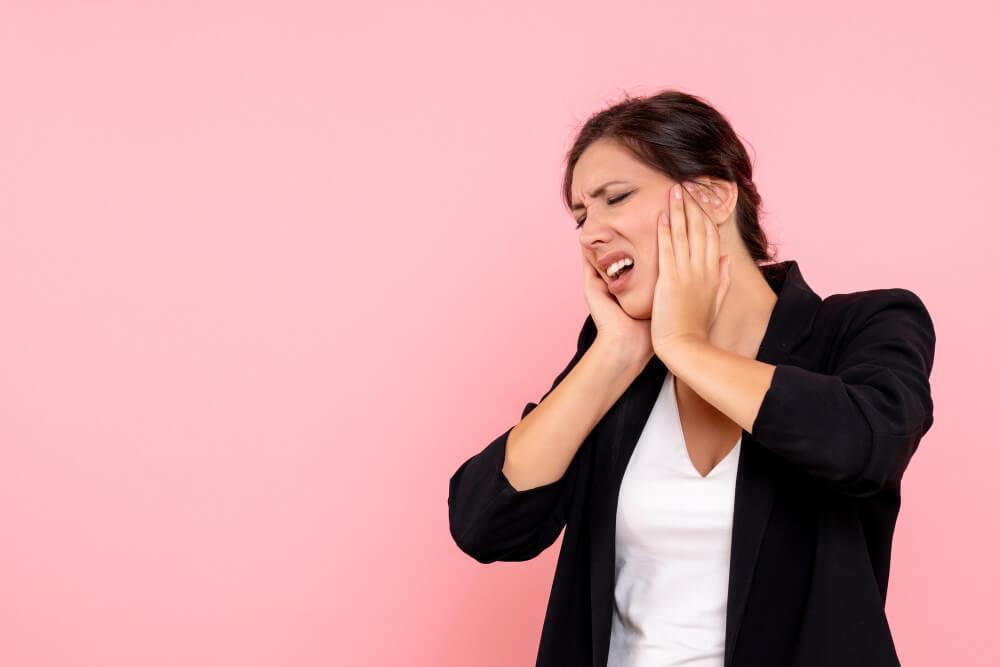
Dental Issues
Tooth decay, gum disease (such as periodontitis), or infections in the teeth or gums can lead to jaw pain. These conditions can cause inflammation and irritation in the surrounding tissues, resulting in discomfort.
Temporomandibular Joint (TMJ) Disorders
TMJ disorders encompass a range of conditions affecting the TMJ and surrounding structures. TMJ dysfunction, often caused by factors like jaw misalignment, arthritis, or excessive stress on the joint, can cause jaw pain. It may be accompanied by clicking or popping sounds, limited jaw movement, or difficulty opening or closing the mouth.
Bruxism
Bruxism refers to the habit of grinding or clenching teeth, particularly during sleep. This repetitive motion places strain on the jaw joint and surrounding muscles, leading to jaw pain. Bruxism is commonly associated with stress, anxiety, or misaligned teeth.
Trauma or Injury
Direct impact or trauma to the jaw or face, such as from sports-related injuries, accidents, or physical altercations, can cause jaw pain. Fractures, dislocations, or soft tissue injuries may occur, resulting in significant discomfort.
Sinus Problems
Sinus infections, sinusitis, or inflammation of the sinus cavities can cause referred pain in the jaw area. The maxillary sinuses, located near the cheekbones, share proximity with the jaw, and inflammation in this region can cause discomfort that may be mistaken for jaw pain.
Stress or Muscle Tension
Osteoarthritis and Rheumatoid Arthritis
Both osteoarthritis and rheumatoid arthritis can affect the temporomandibular joint, leading to inflammation, cartilage damage, and subsequent jaw pain.
Dental Procedures
Certain dental treatments or procedures, such as tooth extractions, root canals, or orthodontic adjustments, may cause temporary jaw pain or soreness due to the manipulation or pressure exerted on the jaw.
Rare Causes of Jaw Pain
While rare, there are some less common causes of jaw pain. These include:
Temporal Arteritis
This is a condition characterized by inflammation of the blood vessels in the head, including the temples. It can cause severe jaw pain, particularly in the temple region, along with other symptoms such as headaches, scalp tenderness, and vision problems.
Trigeminal Neuralgia
It is a condition that affects the trigeminal nerve, causing severe, stabbing, or electric shock-like pain in the face, including the jaw. Trigeminal neuralgia is typically triggered by normal activities like eating, talking, or touching the face.
Osteomyelitis
This is a rare but serious infection of the jawbone. It can occur due to the spread of infection from another area, such as a dental abscess or a jaw fracture. Osteomyelitis causes persistent, deep-seated jaw pain accompanied by swelling, redness, and fever.
Tumors
Rarely, tumors can develop in the jaw or nearby structures, causing localized pain. These tumors can be benign (non-cancerous) or malignant (cancerous), and they may require medical intervention for proper diagnosis and treatment.
Fibromyalgia
While fibromyalgia primarily affects the muscles and soft tissues throughout the body, some individuals with this condition may experience jaw ache or temporomandibular joint (TMJ) discomfort.
Neurological Disorders
Certain neurological conditions like multiple sclerosis (MS) or neuropathies can cause jaw pain as a result of nerve damage or dysfunction.
Medication Side Effects
In rare cases, certain medications, such as bisphosphonates used for osteoporosis treatment, may cause jaw aches or jawbone-related issues like osteonecrosis of the jaw.
Symptoms of Jaw Pain
The symptoms of jaw ache can vary depending on the underlying cause. Here are some common symptoms associated with jaw pain:

Pain or Discomfort
Jaw pain can range from mild to severe, and it may be felt in the jaw joint (TMJ), the jaw muscles, or both. The pain can be dull, aching, throbbing, or sharp.
Difficulty or Discomfort with Jaw Movement
You may experience difficulty or discomfort while opening or closing your mouth fully. This can include limited jaw mobility or a feeling of the jaw getting stuck or locked.
Clicking, Popping, or Grinding Sounds
You may hear clicking, popping, or grinding sounds when you open or close your mouth. These sounds can be indicative of a temporomandibular joint (TMJ) disorder.
Headaches
Jaw ache is often associated with headaches, particularly in the temples or around the temples. These headaches may be tension-type headaches or migraines.
Ear Pain or Ringing
A jaw ache can sometimes radiate to the ears, leading to earaches or a sensation of fullness in the ears. In some cases, it may also cause ear ringing, known as tinnitus.
Facial Pain or Tenderness
The pain may extend to the face, causing facial discomfort or tenderness. This can involve the cheeks, temples, or jawline.
Difficulty Chewing or Biting
Jaw pain can make it challenging to chew or bite down on food. You may experience pain or discomfort while eating, especially when biting into hard foods.
Swelling or Inflammation
In some cases, the jaw area may appear swollen or inflamed. This can be accompanied by redness or warmth in the affected area.
Tooth Sensitivity
Jaw ache can be associated with tooth sensitivity, particularly if the pain is caused by dental issues such as tooth decay or gum disease.
Have You Ever Experienced Jaw Pain?
Jaw pain can be experienced in various situations, depending on the underlying cause. Here are some common situations in which jaw aches may occur:
Chewing or Eating
Jaw pain may be triggered or exacerbated when you chew food, particularly if there is an issue with your teeth, gums, or temporomandibular joint (TMJ).
Speaking of Yawning
Some individuals may experience jaw aches when they speak for prolonged periods or when they yawn widely. This can be due to muscle strain or TMJ dysfunction.
Waking up in the Morning
If you grind or clench your teeth during sleep (bruxism), you may wake up with a jaw ache or muscle soreness in the jaw area.
Stressful Situations
Stress and anxiety can contribute to jaw pain. During times of increased stress, you may unknowingly clench your jaw or tighten your facial muscles, leading to jaw discomfort.
After Dental Procedures
Following certain dental procedures like tooth extractions, root canals, or orthodontic adjustments, you may experience temporary jaw aches or soreness as a result of the manipulation or pressure applied to the jaw.
Trauma or Injury
Jaw pain can occur after a direct blow to the jaw or face, such as from a sports-related incident, accident, or physical altercation.
Throughout the Day
In some cases, jaw ache can be persistent throughout the day, regardless of specific activities or situations. This may be indicative of chronic conditions like TMJ disorders or muscle tension.
Sudden Jaw Pain
Sudden jaw pain refers to the abrupt onset of discomfort or soreness in the jaw area. It can occur without warning and may be caused by various factors, including dental issues, TMJ disorders, muscle strain, or trauma. Sudden jaw ache can make it difficult to open or close the mouth and may be accompanied by other symptoms such as swelling or difficulty chewing.
Jaw Pain on One Side When Opening the Mouth

A jaw ache on the right side near the ear can be attributed to various causes. It is often associated with temporomandibular joint (TMJ) disorders, dental problems, or muscle tension. This pain is localized to the right jaw area and may radiate toward the ear. It can be accompanied by difficulty in jaw movement, clicking sounds, or discomfort while chewing.
Pain Under Ear Behind Jaw Bone Left and Right Side
Pain under the ear behind the jawbone on both the left and right sides can be indicative of various conditions. It may be associated with issues such as salivary gland infections, swollen lymph nodes, temporomandibular joint (TMJ) disorders, or dental problems. Other possible causes include ear infections, sinusitis, or even referred pain from the throat or neck.
Pain in the Right Side of the Face Jaw and Ear
Pain in the right side of the face, jaw, and ear can stem from various sources. Temporomandibular Joint (TMJ) disorder, arising from jaw joint issues, may cause discomfort radiating to the ear and face. Dental problems, such as tooth decay or gum disease on the right side, can also lead to referred pain. Sinusitis, inflammation or infection of the right sinuses, can trigger facial pain extending to the jaw and ear. Trigeminal neuralgia, a nerve condition, may cause severe, stabbing pain in these areas. Ear infections on the right side can also induce earache and facial discomfort.
Jaw Ache While Biting
Jaw ache while biting, known as odontalgia, can occur due to various reasons. It may be caused by dental issues such as tooth decay, dental abscess, cracked tooth, or gum disease. Malocclusion (misaligned bite), teeth grinding, or jaw joint problems like TMJ disorders can also contribute to pain during biting.
Jaw Ache While Sleeping
A jaw ache while sleeping can be caused by several factors. It may be due to teeth grinding or clenching, a condition known as bruxism. This excessive force exerted on the jaw can lead to muscle tension and pain. Additionally, sleep positions that place pressure on the jaw or underlying structures can contribute to discomfort. Using a nightguard or splint, practicing relaxation techniques, and adjusting sleep positions can help alleviate jaw pain during sleep.
Jaw Pain Relief
To find relief from jaw aches, here are some strategies that may help:

Apply Heat or Cold Packs
Applying a warm compress or an ice pack can help alleviate jaw pain. The heat helps relax the muscles and increase blood flow, while cold packs reduce inflammation and numb the area. You can experiment with both heat and cold to see which provides more relief for your specific situation.
Practice Relaxation Techniques
Jaw ache can be influenced by stress and tension. Deep breathing exercises, meditation, and progressive muscle relaxation techniques can help relax the jaw muscles and reduce pain. Stress management techniques, such as yoga or mindfulness, may also be beneficial.
Avoid Hard or Chewy Foods
Opt for soft foods that require minimal chewing to reduce strain on the jaw. Soups, mashed potatoes, yogurt, and smoothies are good options. Avoid chewy foods like gum, tough meats, or sticky candies that can exacerbate jaw aches.
Practice Good Posture
Poor posture can contribute to jaw pain. Maintain proper alignment by sitting up straight, keeping your shoulders relaxed, and avoiding habits like slouching or cradling your phone between your shoulder and ear. This helps reduce strain on the jaw and neck muscles.
Use Over-the-Counter Pain Relievers
Nonsteroidal anti-inflammatory drugs (NSAIDs) like ibuprofen or acetaminophen can provide temporary relief from jaw aches. However, it’s important to follow the recommended dosage and guidelines provided on the packaging. If your pain persists or worsens, consult a healthcare professional for further evaluation.
Avoid Habits that Strain the Jaw
Certain habits can strain the jaw and contribute to pain. Chewing gum, biting your nails, clenching your jaw, or resting your chin on your hand should be avoided to prevent exacerbation of the pain.
Jaw Pain Exercises
Here are a few jaw pain relief exercises that you can try:
Jaw Opening and Closing
Slowly open your mouth as wide as possible without causing pain. Hold it open for a few seconds, and then close your mouth slowly. Repeat this exercise several times to help improve jaw mobility and relieve tension.
Resisted Jaw Opening
Place your thumb or two fingers under your chin. Apply gentle resistance as you try to open your mouth, engaging the muscles of the jaw. Hold the resistance for a few seconds, then relax. Repeat this exercise several times to strengthen the jaw muscles and improve their flexibility.
Jaw Side-to-Side Movement
To stretch and loosen the jaw muscles, slowly and gently move your lower jaw from side to side. Begin with small movements and gradually increase the range of motion based on your comfort level. This exercise aids in improving flexibility and relieving tension in the jaw muscles.
Chin Tucks
Maintain an upright posture while standing or sitting. Retract your chin slowly by pulling it straight back, avoiding any tilting of the head. Hold this position for a few seconds before releasing and relaxing. Repeat this exercise multiple times to strengthen the muscles that assist in maintaining proper alignment of the jaw.
Tongue Press
Apply firm pressure with your tongue against the roof of your mouth. Hold this pressure for a few seconds before releasing it. Repeat this exercise several times to activate and strengthen the muscles responsible for jaw movement.
Jaw Pain Massage
Massage can be a helpful technique for relieving jaw aches. Consider experimenting with the following techniques:
External Jaw Massage
Place your fingertips on the jaw joint just in front of your ears. Apply light pressure and perform gentle circular motions. Gradually move your fingers along the jawline towards your chin. Repeat this motion several times, focusing on areas that feel tense or tender.
Cheek Massage
Utilize your fingertips to massage your cheeks using circular motions. Start from the center of your face and work your way outward toward your ears. This can help relax the muscles around the jaw and provide relief.
Temporal Massage
Place your fingertips on your temples, just above your ears. Apply a gentle amount of pressure while making small circular motions. Gradually move your fingers in a slow, circular motion toward the center of your forehead. Repeat this motion several times to help release tension in the temporal region, which can alleviate jaw pain.
Masseter Muscle Massage
Locate the masseter muscles, which are the large muscles on either side of your jaw. Use your fingertips or knuckles to apply gentle pressure and make circular motions on these muscles. Start from the bottom of the jaw and work your way up towards the ears. Remember to exercise caution and avoid exerting excessive pressure during the massage.
Jaw Stretching Massage
Gently open your mouth as wide as possible without causing pain. Place your fingertips on the upper and lower jaw near the back molars. Apply gentle pressure and slowly move your fingertips toward the front of your mouth. This can help stretch the jaw muscles and alleviate tension.
Jaw Pain Medical Treatment

Medical treatment for jaw ache depends on the underlying cause and severity of the condition. Here are several medical treatments that healthcare professionals commonly recommend:
Medications
Nonsteroidal anti-inflammatory drugs (NSAIDs) like ibuprofen or naproxen can help reduce inflammation and relieve pain associated with jaw conditions. Healthcare professionals may prescribe muscle relaxants to help relieve muscle spasms. In some cases, low-dose antidepressants or anti-seizure medications may be prescribed for chronic or severe pain.
Oral Splints or Mouthguards
Custom-made oral splints or mouthguards can help reposition the jaw, reduce grinding or clenching, and alleviate pressure on the joint. They are often used for temporomandibular joint (TMJ) disorders or teeth grinding (bruxism).
Physical Therapy
A physical therapist with expertise in jaw disorders can guide you through specific exercises and stretches to improve jaw mobility, reduce muscle tension, and enhance jaw stability. They may also incorporate other modalities like ultrasound therapy or electrical stimulation.
Dental Treatments
Dental procedures may be necessary to address issues contributing to jaw pain. This could involve dental restoration for tooth decay, periodontal treatment for gum disease, or orthodontic treatment to correct misaligned teeth and improve bite alignment.
Injections
In some cases, corticosteroid injections may be administered directly into the jaw joint to reduce inflammation and provide pain relief.
Botox Injections
Botulinum toxin injections (Botox) can be used to temporarily paralyze or relax the jaw muscles, reducing muscle spasms and relieving pain. This treatment is typically reserved for severe cases and administered by specialists.
Surgery
Surgical intervention is considered a last resort for severe or unresponsive cases of jaw ache. Procedures may include arthrocentesis (joint flushing), arthroscopy (minimally invasive surgery to repair the joint), or open-joint surgery for more complex cases.
It’s important to consult with a healthcare professional or specialist for an accurate diagnosis and personalized treatment plan. They can assess your specific condition, recommend the most appropriate medical treatments, and guide you through the recovery process.
Prevention
Preventing jaw pain involves adopting healthy habits and minimizing behaviors that strain the jaw. Here are several preventive measures you can consider:

Maintain Good Posture
Practice proper posture throughout the day, especially when sitting or using electronic devices. Avoid slouching and keep your shoulders relaxed. This helps maintain proper alignment of the jaw and reduces strain on the muscles.
Practice Stress Management
Stress and anxiety can contribute to jaw aches. Engage in stress-reducing activities such as deep breathing exercises, meditation, yoga, or hobbies you enjoy. Managing stress helps prevent jaw muscle tension and pain.
Avoid Excessive Jaw Movements
Avoid habits that strain the jaw, such as excessive yawning, chewing gum, or biting on hard objects. Minimizing these movements can reduce the risk of jaw muscle fatigue and discomfort.
Maintain Oral Hygiene
Follow good oral hygiene practices, including regular brushing, flossing, and dental check-ups. Proper oral hygiene reduces the risk of dental issues that can cause jaw aches.
Use Proper Ergonomics
Ensure your work environment is ergonomically designed. Position your computer monitor at eye level, use an ergonomic chair, and take regular breaks to stretch and relax your jaw and neck muscles.
Avoid Teeth Grinding and Clenching
If you grind or clench your teeth, particularly during sleep, consult a dentist. They may recommend wearing a mouthguard or splint to protect your teeth and prevent jaw pain.
Practice Jaw Muscle Relaxation
Before bed and throughout the day, practice relaxation exercises to release tension in the jaw muscles. This can include gently massaging the jaw, doing jaw stretches, or using heat packs to relax the muscles.
Avoid Excessive Chewing
Minimize chewing on tough or chewy foods, especially if you have a history of jaw pain. Choose softer food options that are easier to chew.
Be Mindful of Your Jaw Position
Throughout the day, be mindful of your jaw position. Avoid clenching or tensing your jaw and keep your teeth slightly apart when your jaw is at rest.
Seek Dental Evaluation
Regular dental check-ups can help identify any dental issues that may contribute to jaw aches. Addressing dental problems promptly can prevent or minimize jaw discomfort.
FAQ
Q: What are the Common Causes of Jaw Pain?
A: Common causes of jaw ache include temporomandibular joint disorders (TMJ), teeth grinding (bruxism), dental issues (such as tooth decay or infection), jaw muscle tension, sinus infections, and trauma to the jaw or face.
Q: When Should I See a Healthcare Professional for Jaw Pain?
A: You should consider seeking medical attention if your jaw ache is severe, persistent, or worsens over time. Additionally, if the pain is accompanied by other symptoms like difficulty opening or closing your mouth, clicking or popping sounds, or changes in your bite, it is advisable to consult a healthcare professional.
Q: Can Stress Contribute to Jaw Pain?
A: Yes, stress and anxiety can contribute to jaw aches by causing muscle tension and clenching of the jaw. This can lead to temporomandibular joint (TMJ) disorders and muscle strain, resulting in jaw pain.
Q: How Can I Manage Jaw Pain at Home?
A: Home remedies for managing jaw aches include applying heat or cold packs, practicing relaxation techniques, avoiding hard or chewy foods, maintaining good posture, and practicing jaw exercises or stretches. Over-the-counter pain relievers can also offer temporary relief.
Q: Can Jaw Ache be Prevented?
A: While it may not be possible to prevent all instances of jaw pain, there are preventive measures that can reduce the risk. These include practicing good posture, managing stress, avoiding excessive jaw movements, maintaining oral hygiene, using proper ergonomics, and seeking dental evaluation regularly.
Q: How is Jaw Pain Diagnosed?
A: Diagnosis involves a physical examination of the jaw, and dental evaluation, and may include X-rays, CT scans, or MRI imaging to assess the jaw joint and surrounding structures.
Q: What are Some Common Treatments for Jaw Pain?
A: Common treatments for jaw aches include medications (NSAIDs, muscle relaxants), oral splints or mouthguards, physical therapy, dental treatments (restorations, orthodontics), and, in severe cases, surgical interventions.
Q: Are there any Specific Jaw Exercises for Pain Relief?
A: Yes, jaw exercises like jaw opening and closing, resisted jaw opening, side-to-side movements, chin tucks, and tongue presses can help improve jaw mobility and relieve tension.
Q: Can Jaw Ache be a Symptom of a More Serious Condition?
A: Yes, jaw pain can be a symptom of more serious conditions such as TMJ disorders, trigeminal neuralgia, or heart problems. It’s essential to seek medical attention for a proper diagnosis if the pain persists or worsens.
Q: Are There Any Lifestyle Changes that Can Help with Jaw Pain?
A: Incorporating healthy habits into your lifestyle, such as avoiding hard or chewy foods, limiting caffeine and alcohol intake, quitting smoking, and practicing relaxation techniques, can contribute to the management of jaw aches and support overall oral health.
Q: When is Surgery Considered for Treating Jaw Pain?
A: Surgery is typically considered a last resort for severe or unresponsive cases of jaw ache. It may be recommended when conservative treatments have failed to alleviate symptoms or in cases of structural abnormalities or significant joint damage.
Please note that the information provided here is not a substitute for medical advice. If you are experiencing jaw pain or have specific concerns, it is recommended to consult with a healthcare professional for a proper evaluation and guidance tailored to your situation.
Conclusion
Jaw pain can be a distressing and debilitating condition, but there are various strategies for understanding, managing, and preventing it. It can be caused by numerous factors, including temporomandibular joint disorders (TMJ), dental issues, muscle tension, or underlying medical conditions. Identifying the underlying cause is essential for implementing effective treatment strategies.
Home remedies such as heat or cold therapy, jaw exercises, stress management, and good oral hygiene practices can provide relief. Additionally, medical treatments such as medications, splints, physical therapy, and, in severe cases, surgery may be recommended. Prevention through maintaining good posture, stress management, and avoiding excessive jaw movements is key.
Consulting with healthcare professionals and specialists is essential for an accurate diagnosis, personalized treatment plans, and long-term management of jaw pain.
Resources
Image Designed by Freepik
References
https://www.ncbi.nlm.nih.gov/books/NBK551612/
https://www.ncbi.nlm.nih.gov/pmc/articles/PMC8910597/
https://www.mdpi.com/1660-4601/19/5/3052
https://www.mdpi.com/1660-4601/19/24/16840
https://www.aaoms.org/media/press-releases/joms-study-botox-can-relieve-jaw-muscle-pain
https://www.nidcr.nih.gov/health-info/tmd


